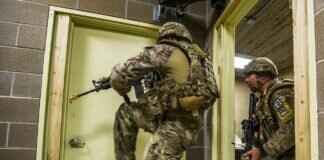When immigration agents recently started doing welfare checks on kids who came to the border without their parents, advocates got kinda freaked out, thinking it was a way to target the minors, their adult sponsors, and maybe others for deportations. Stories about these surprise visits popped up all over the place — agents trying to get into two elementary schools in LA; agents showing up “five deep and armed” at an immigration lawyer’s 19-year-old client’s house in Virginia; agents interviewing a scared 16-year-old girl from Honduras at her uncle’s place in Washington state. Department of Homeland Security peeps have said the checks are part of an effort to make sure that kids who came alone are “safe and not being exploited, abused, and sex trafficked.” But immigrant advocates are saying some visits have led to kids being forced to leave the country with their deported parents or being taken away from their sponsors and put in federal custody. Advocates are bringing up the case of a 17-year-old from Honduras in Hawaii whose older brother got nabbed by federal agents. The boy was taken to a facility for unaccompanied youths in California. Jen Smyers, who used to be chief of staff under Biden’s administration for the Office of Refugee Resettlement, which looks after unaccompanied kids, said, “This is just par for the course for an administration that has staked their claim on making life so incredibly difficult for immigrants at large that they think people will leave and not come to the U.S.” Fear of the welfare checks “drives people underground, increases exploitation and trafficking,” Smyers said. “And they’re doing it with this weird narrative by saying that they care about kids. But all they’re doing is messing up these kids’ lives.”
Those under review by the Trump administration are among the roughly 450,000 children who crossed the U.S.-Mexico border without their parents and were released to sponsors during President Biden’s term. Kids who arrive solo are put in the custody of the Office of Refugee Resettlement, which is under the Department of Health and Human Services. The department has to screen adult sponsors who volunteer to take care of the kids, usually their parents or other relatives. Shortly after Trump became prez, his administration came up with a plan involving a bunch of agencies to find unaccompanied kids, check if they’re being trafficked, and deport those who can be kicked out. An internal memo from Immigration and Customs Enforcement, which was snagged by The Times, lays out this four-phase operation. The memo says agents should focus on kids who missed an immigration hearing, those the government can’t reach since they went to sponsors, those seen as a threat to public safety, and those with deportation orders. The agency is also homing in on kids released from federal custody to sponsors who aren’t blood relatives, including super sponsors who’ve taken in more than three unaccompanied children.
The sponsorship program has had some issues lately. A federal watchdog report from last year said the government didn’t properly check some sponsors. Thousands of kids quickly released from government shelters were later taken advantage of by big companies. Last month, a federal grand jury charged a man with luring a 14-year-old girl from Guatemala to the U.S. and falsely claiming she was his sister to get custody as her sponsor. The Associated Press said about 100 kids have been taken from their sponsors this year and put back in federal custody, and 450 cases with complaints have been handed over to federal law enforcement. The review of sponsorships under the Trump administration is being led by two branches of ICE: Enforcement and Removal Operations, or ERO, and Homeland Security Investigations, or HSI. Along with fighting human trafficking, the effort is trying to find potential candidates for deportation. The Homeland Security and Health and Human Services departments haven’t said anything about this.
In the last two months, immigration lawyers say agents have tried to scare minors. In one case in California, underage clients opened the door to find agents in regular clothes asking about their mom and if they had a job. Another family told their lawyer that HSI agents came while the kid was at school, but then they came back four times in one day looking for the student. This tactic puts sponsors who aren’t authorized to be in the country or live in mixed-status homes at risk, said Karina Ramos, a managing attorney at the Immigrant Defenders Law Center in LA. “It’s definitely gonna make sponsors nervous if they know immigration officers will question their status,” she said.














